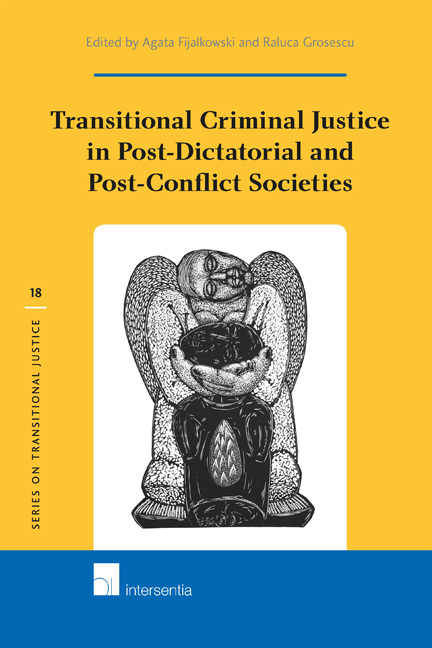Book contents
Introduction
Published online by Cambridge University Press: 28 November 2017
Summary
This volume critically considers the manner in which post-dictatorial and post-conflict states are addressing past human rights violations through judicial accountability. The book's main objectives concern a fresh, contemporary, and critical analysis of transitional criminal justice as a concept and its related measures, beginning with the initiatives that have been put in place with the fall of the Communist regimes in Europe in 1989. By transitional criminal justice we understand mechanisms of judicial accountability carried out in post-dictatorial or post-conflict states in order to address past human rights abuses. In addition to trials, the concept also refers to cases where criminal law mediates other measures of accountability. The project argues for rethinking and revisiting filters that scholars use to interpret key issues of transitional criminal justice, such as: (1) the relationship between judicial accountability, democratisation and politics in transitional societies; (2) the role of successor trials in rewriting history; (3) the interaction between domestic and international actors and norms in shaping transitional justice; and (4) the paradox of time in enhancing accountability. In order to accomplish this, the volume considers cases of domestic accountability in the post-1989 era, from different geographical areas, such as Europe, Asia and Africa, in relation to key events from various periods of time. In this way the approach, which investigates space and time-lines in key examples, also takes into account a longitudinal study of transitional criminal justice itself.
GENERAL OVERVIEW
Judicial accountability for human rights violations was at the core of transitional justice debates in the first two decades that followed the end of WWII. The Nuremberg and Tokyo trials, as well as the activity of domestic courts in charge with the conviction of crimes against humanity and war crimes committed by the Axis countries, have been the subject of an impressive amount of scholarship. In the aftermath of WWII, criminal trials appeared to be for many researchers the most efficient instrument of transitional justice. However, with the democratisation processes that followed in the 1970s, 1980s and 1990s in Southern Europe, Latin America and Eastern Europe, truth or historical commissions, lustration or disclosure of former political police agents took the lead as instruments of reckoning with the dictatorial past. Criminal trials continued to play a certain role in transitional justice, but in many cases their scope was narrower than the scope of administrative justice, at least as regards domestic accountability.
- Type
- Chapter
- Information
- Publisher: IntersentiaPrint publication year: 2015

